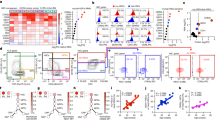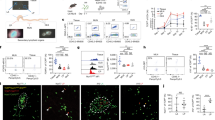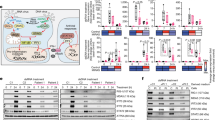Abstract
INSULIN-DEPENDENT diabetes mellitus (IDDM) in non-obese diabetic (NOD) mice results from the T-lymphocyte-mediated destruction of the insulin-producing pancreatic β-cells and serves as a model for human IDDM1. Whereas a number of autoantibodies are associated with IDDM2, it is unclear when and to what β-cell antigens pathogenic T cells become activated during the disease process. We report here that a T-helper-1 (Thl) response to glutamate decarboxylase develops in NOD mice at the same time as the onset of insulitis. This response is initially limited to a confined region of glutamate decarboxylase, but later spreads intramolecularly to additional determinants. Subsequently, T-cell reactivity arises to other β-cell antigens, consistent with intermolecular diversification of the response. Prevention of the spontaneous anti-glutamate decarboxylase response, by tolerization of glutamate decarboxylase-reactive T cells, blocks the development of T-cell autoimmunity to other β-cell antigens, as well as insulitis and diabetes. Our data suggest that (1) glutamate decarboxylase is a key target antigen in the induction of murine IDDM; (2) autoimmunity to glutamate decarboxylase triggers T-cell responses to other β-cell antigens, and (3) spontaneous autoimmune disease can be prevented by tolerization to the initiating target antigen.
This is a preview of subscription content, access via your institution
Access options
Subscribe to this journal
Receive 51 print issues and online access
$199.00 per year
only $3.90 per issue
Buy this article
- Purchase on Springer Link
- Instant access to full article PDF
Prices may be subject to local taxes which are calculated during checkout
Similar content being viewed by others
References
Castaño, L. & Eisenbarth G. S. A. Rev. Immun. 8, 647–679 (1990).
Palmer, J. P. Diabetes, Rev. 1, 104–115 (1993).
Kaufman, D. L., McGinnis, J. F., Krieger, N. R. & Tobin, A. J. Science 232, 1138–1140 (1986).
Erlander, M. G., Tillakaratne, N. J. K., Feldblum, S., Patel, N. & Tobin, A. J. Neuron 7, 91–100 (1991).
Kaufman, D. L. & Tobin, A. J. Trends pharmac. Sci. 14, 107–109 (1993).
Baekkeskov, S. et al. Nature 298, 167–169 (1982).
Baekkeskov, S. et al. Nature 347, 151–156 (1990).
Atkinson, M. A., Maclaren, N. K., Scharp, D. W., Lacy, P. E. & Riley, W. J. Lancet 335, 1357–1360 (1990).
Kaufman, D. L. et al. J. clin. Invest. 89, 283–292 (1992).
Castaño, L., Russo, E., Zhou, L., Lipes, M. A. & Eisenbarth G. S. J. clin. endocrin. Metab. 73, 1197–1201 (1991).
Elias, D., Markovits, D., Reshef, T., van der Zee, R. & Cohen, I. R. Proc. natn. Acad. Sci. U.S.A. 87, 1576–1580 (1990).
Elias, D. et al. Proc. natn. Acad. Sci. U.S.A. 88, 3088–3091 (1991).
Croft, M., Duncan, D. & Swain, S. L. J. exp. Med. 176, 1431–1437 (1992).
Bradley, L. M., Atkins, G. G. & Swain S. L. J. Immun. 148, 324–331 (1992).
Ando, D. G., Clayton, J., Kono, D., Urban, J. L. & Sercarz, E. E. Cell. Immun. 124, 132–143 (1989).
Lehmann, P. V., Forsthuber, T., Miller, A. & Sercarz, E. E. Nature 358, 155–157 (1992).
Watanabe, R., Wege, H. & ter Meulen, V. Nature 305, 150–153 (1983).
Lehmann, P. V., Sercarz, E. E., Forsthuber, T., Dayan, C. M. & Gammon, G. Immun. Today 14, 203–208 (1993).
Sarvetnick, N. et al. Nature 346, 844–847 (1990).
Heath, W. R. et al. Nature 359, 547–549 (1992).
Gammon, G. & Sercarz, E. E. Nature 342, 183–185 (1989).
Zhang, Z. J., Davidson, L., Eisenbarth, G. & Weiner, H. L. Proc. natn. Acad. Sci. U.S.A. 88, 10252–10256 (1991).
Qin, H.-Y., Sadelain M. W. J., Hitchon, C., Lauzon, J. & Singh, B. J. Immun. 150, 2072–2080 (1993).
Atkinson M. A. et al. Lancet 339, 458–459 (1992).
Bu, D. F. et al. Proc. natn. Acad. Sci. U.S.A. 89, 2115–2119 (1992).
Hochuli, E., Bannwarth, W., Döbeli, H., Gentz, R. & Stüber, D. Bio/Technology 6, 1321–1325 (1988).
Macy, E., Kemeny, M. & Saxon, A. FASES J. 3003–3009 (1988).
Taguchi, T. et al. J. Immun. 145, 68–77 (1990).
Lee, D. S., Tian, J., Phan, T. & Kaufman, D. L. Biochim. biophys. Acta 1216, 157–160 (1993).
Author information
Authors and Affiliations
Rights and permissions
About this article
Cite this article
Kaufman, D., Clare-Salzler, M., Tian, J. et al. Spontaneous loss of T-cell tolerance to glutamic acid decarboxylase in murine insulin-dependent diabetes. Nature 366, 69–72 (1993). https://doi.org/10.1038/366069a0
Received:
Accepted:
Issue Date:
DOI: https://doi.org/10.1038/366069a0
This article is cited by
-
Non-autoimmune acute-onset type 1 diabetes mellitus newly developed in an elderly patient presenting elevation of serum pancreatic exocrine enzymes
Diabetology International (2022)
-
Curcumin induces regeneration of β cells and suppression of phosphorylated-NF-κB in streptozotocin-induced diabetic mice
The Journal of Basic and Applied Zoology (2020)
-
Multiple antigen-engineered DC vaccines with or without IFNα to promote antitumor immunity in melanoma
Journal for ImmunoTherapy of Cancer (2019)
-
Role of TGF-β in Self-Peptide Regulation of Autoimmunity
Archivum Immunologiae et Therapiae Experimentalis (2018)
-
Mechanisms of diabetic autoimmunity: I—the inductive interface between islets and the immune system at onset of inflammation
Immunologic Research (2016)
Comments
By submitting a comment you agree to abide by our Terms and Community Guidelines. If you find something abusive or that does not comply with our terms or guidelines please flag it as inappropriate.



